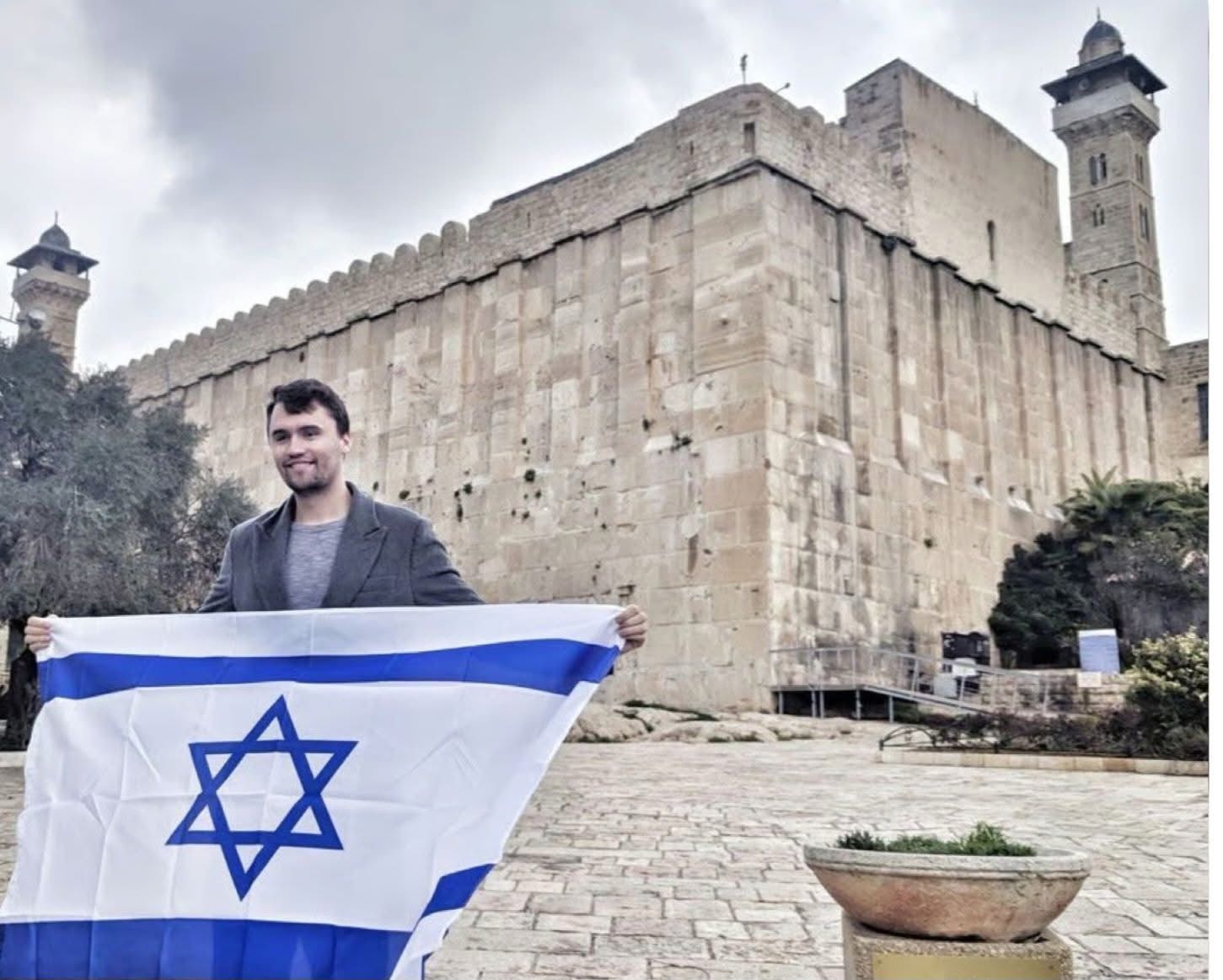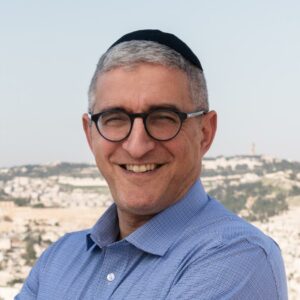Charlie Kirk’s murder at age 31 has left a wound that goes far beyond politics. For his wife Erika and their two children, it is a personal tragedy beyond words. For the movement he helped build, it is a seismic loss. And for Israel and the Jewish people, his death has silenced one of the clearest, fiercest voices of support in a generation.
Kirk’s role as a defender of Israel is not well understood, even among many Jews. That is because he did not fit the mold of past advocates. He did not read from a script or demand unthinking loyalty to every Israeli government decision. Instead, he met the challenges of a new generation — the MAGA, America First world of young conservatives — by engaging honestly, debating openly, and defending Israel with a combination of clarity and authenticity that few others could match.
At campus after campus, half the questions he faced were about Israel. He didn’t brush them aside. He took them head on. And time after time, he left audiences with a deeper understanding of Israel’s place in the world and the moral stakes of its fight for survival.
Meeting the MAGA Generation Where They Are
Charlie understood something that many older Jews never grasped: in the America First movement, credibility matters more than polished talking points. Young conservatives are disillusioned with politics, hostile to institutions, and suspicious of anything that sounds prepackaged. If you try to silence dissent, they tune you out.
This is why Charlie sometimes allowed views critical of Israel onto his stages, and why he occasionally expressed his own criticisms of Israeli policy. He knew that purity tests would only alienate his audience. When he allowed Tucker Carlson to speak at Turning Point USA conferences, it understandably infuriated many Jews. How could he give a platform to an anti-Israel conspiracy theorist? But Charlie’s approach was different. He believed that silencing voices like Carlson’s would only drive young conservatives further away from Israel. By creating space for debate, he earned the right to step in with moral clarity — and when it counted, he did.
Rabbi Tuly Weisz, founder of Israel365, explained it this way: “Charlie was sometimes misunderstood, even unfairly accused by left-wing Jewish organizations like the ADL of antisemitism, simply because he gave a platform to voices like Tucker Carlson. I understand their concern, but Charlie had a different approach. He recognized that true strength doesn’t come from silencing disagreement but from confronting it openly, with confidence and moral clarity. That is why he welcomed all voices—even those he did not agree with—into the conversation.”
He often reminded his critics that he spent as much as half his speaking tours defending Israel. The hostility he faced didn’t deter him — it drove him. At Cambridge University, when a student accused Israel of genocide, he responded: “A child who knows that Israel is the good guy, Hamas is bad, has a lot more wisdom than a student like yourself.”
In another forum, he turned the tables on an opponent: “If Israel stopped fighting, what would happen if they laid down all their guns tomorrow? All the Jews would be killed. If Hamas laid down all of their weapons, what would we have? Peace is what we would have.”
Charlie also confronted the darker currents that have crept into the MAGA base itself. Where others downplayed the rise of antisemitism on the Right, he named it. “There’s this dark Jew hate out there, and you see it, and I see it. I hate it,” he told one Turning Point USA audience. “Don’t get yourself involved in that. It will rot your brain. It’s bad for your soul. It’s evil. I think it’s demonic.”
Those words mattered because they came from someone his audience trusted. Charlie didn’t scold them from the outside. He stood inside the movement, fought for its soul, and told his followers the truth even when it risked backlash.
Charlie’s effectiveness came in part from his ability to expose hypocrisy. He often pointed out the selective outrage aimed at Israel:
“Israel is not a perfect country. But why is there such an obsession with the one place where half the world’s Jews live — a small outpost of freedom and liberty, with all its challenges, surrounded by a billion Muslims? That’s what becomes the number one focus geopolitically. People throw around the word ‘genocide,’ yet they refuse to use it when Jews are killed, but they do when Palestinians are killed. That shows the deep moral confusion on this topic.”
He mocked the absurdity of those who condemned Israel’s defensive actions while ignoring Hamas’s barbarism. “The IDF actually gave warnings to apartment buildings,” he said. “What kind of supposedly ‘evil’ country tells people to leave before they bomb a target? Meanwhile, Hamas comes on a holy day into kibbutzim and literally cuts women’s heads off at concerts. So who is really the bigger impediment to peace — Hamas or Israel?”
And when confronted with calls for ceasefires, he reminded audiences what started the war: “The war began because 1,300 Jews were murdered and 200 were taken hostage. That’s the truth. A tragic reality of war is that civilians die — no one likes it, and no one with a heart or a soul wants to see it happen. But you have to be clear about who started this conflict. That matters.”
Charlie wasn’t afraid to go into detail when students challenged him about Gaza or the Palestinian Authority.
“So, who ran Gaza up until 2005?” he asked one student.
“Israel did. Israel used to occupy the Gaza Strip.”
“10,000 Jews left Gaza. The IDF totally withdrew. Why did Israel do that? To pursue peace. Because they were promised a peace deal. And then Hamas took over and it’s now a hot tub for terrorists where there are thousands of rockets every month. Where was the peace after they withdrew?”
He exposed the corruption of Palestinian leadership: “Why hasn’t the PA had an election in twelve years? Mahmoud Abbas is a dictator of the PA that uses the money and the aid that we give him to enrich himself.”
And he challenged double standards on women’s rights: “Where is it better for a woman to live in the Middle East? Tel Aviv or Damascus, Amman, or Cairo? Israel is the only country in the region that has ever had a female prime minister.”
Faith at the Core
Charlie’s defense of Israel was not only political. It was also personal and spiritual. For him, Israel was more than an ally in a dangerous region; it was a place that confirmed the truth of his faith and the reality of the Bible he lived by.
“Israel changed my life,” he often said. “It strengthened my faith, made the Bible pop into reality, and gave me the most precious memories with Erika.”
That conviction shaped everything he said about the Jewish state. He viewed Israel not only as a strategic partner but as living proof of God’s promises. “We believe that the creation of the state of Israel in the 1940s was a fulfillment of prophecy,” he explained. “Seven million Jews out of fourteen million now have a home. That idea needs to be defended.”
Even in political debates, he tied his arguments back to faith. “Being able to prove that the Bible is true is a very important thing as a Christian,” he said. “There has never been an archaeological discovery in Israel that has disproven the Bible.”
Rabbi Weisz reflected: “When we ask today: who are the most pro-Israel Christians? For years, Pastor John Hagee carried that banner. But Charlie represented something new — the face of a younger generation of Christians who stood boldly with Israel and the Jewish people.”
Misunderstood by Some, Indispensable to Many
Not all Jews saw Kirk’s work for what it was. Some recoiled from his style. Others distrusted his politics. But as Rabbi Pesach Wolicki wrote: “Simply put, the stark truth is that public opinion on Israel among young American conservatives is trending in a troubling direction. It is equally true that if not for Charlie Kirk and Turning Point USA, the problem would be far worse.”
Rabbi Weisz added that Kirk constantly warned of the dangers of what he called the “anti–red-green alliance”—the deadly combination of Marxism and Islamism threatening Western civilization. “He always reminded us that the antidote to that darkness was light: biblical truth, moral courage, and faith in God,” Weisz said.
Charlie’s occasional criticisms of Israel were not betrayal. They were the very thing that gave him the credibility to defend Israel day after day, in the toughest environments, against the toughest critics. That was the point too many missed.
Charlie Kirk was murdered while doing what he had always done: taking questions, sparring with students, and refusing to give ground to confusion or lies. He will be remembered for many things — his political work, his leadership of Turning Point USA, his influence on American conservatism. But for Jews and for Israel, his legacy will be this: he showed that in the America First generation, defending Israel requires honesty, credibility, and courage.
“No non-Jewish person my age has a longer or clearer record of support for Israel, sympathy with the Jewish people, or opposition to antisemitism than I do,” he once said. It was true then, and it remains true now.
In Rabbi Weisz’s words: “A political assassin may have tried to silence him, but it will have the opposite effect. Charlie’s voice will not be silenced. His torch has now been passed to us. We will carry it forward. We will speak the truth he lived and died for. And through us, Charlie Kirk will keep fighting for our future.”
Charlie Kirk is gone, but his voice, his example, and his clarity must not be lost.





